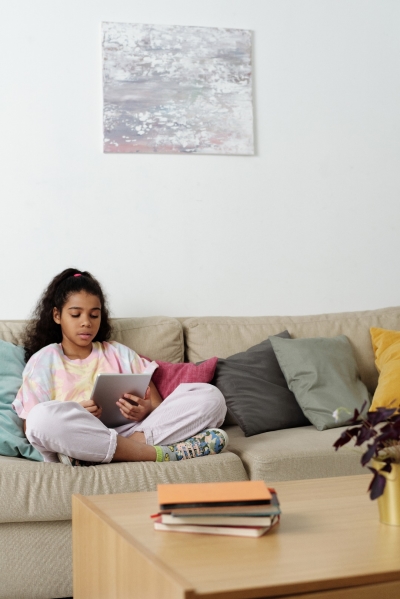
EMF: The Best Social Campaigns
Cyprus, The National Committee on Environment and Children’s Health
A video campaign launched by The National Committee on Environment and Children’s Health in Cyprus aroused interest internationally. Different organizations from all around the world gave their appreciation to the idea of teaching children and teenagers with these kinds of videos. They are very informative about the health risks of being exposed to non-ionizing radiation.
You can watch the first one, aimed at the parents of children in kindergartens, below. The video was translated into English by the Environmental Health Trust, an organization led by Devra Davis.
"Reduce children's exposure to wireless" states the Cyprus Government's Cyprus National Committee on Environment and Children's Health.
The video is educational and it makes viewers think. When a little girl asks “why do you radiate us with wireless?”, most parents will reconsider exposing their offspring to electronic devices. The way electromagnetic waves work is well explained so that everyone will understand it.
It was created to ensure the people of Cyprus that the government’s decision to ban WiFi in kindergartens and primary schools was right. Joining France and Israel in the choice to remove a wireless connection to the Internet from schools. Informing others about the potential health risks of exposure was necessary because numerous people were unconvinced about this decision. Their doubts were raised due to a lack of knowledge and awareness.
This year, another video was released. The message was aimed at teenagers. In the video, children talk about their lifestyle, which is strongly connected to being online. Most teenagers and their smartphones, tablets and laptops are inseparable. It is essential to talk to them about keeping up good habits in terms of reducing EMF exposure.
ΠΡΟΣΤΑΤΕΥΤΕΙΤΕ ΑΠΟ ΤΗΝ ΑΚΤΙΝΟΒΟΛΙΑ ΤΩΝ ΚΙΝΗΤΩΝ, ΤΑ WI-FI ΚΑΙ ΤΑ ΔΕΔΟΜΕΝΑ ΚΙΝΗΤΗΣ ΤΗΛΕΦΩΝΙΑΣ (3G, 4G κ.α.)
The mission of the National Committee on Environment and Children’s Health in Cyprus is to protect children (and unborn babies) from any environmental dangers which put their health at risk. It is highly appreciable that the impact of electromagnetic fields is one of the factors that they are aware of.
The BabySafe Project
The BabySafe Project was inspired by the research provided by Dr. Hugh Taylor at Yale University School of Medicine, as well as many other studies. They have shown that prenatal exposure to radiation may result in some behavioural problems in the offspring, such as hyperactivity.
The aim of the campaign is to educate pregnant woman on the safe use of electronic devices in order to protect their unborn babies. An ebook was issued and can be downloaded from the project’s website. The project hopes to make pregnant women aware of the possible risks of overexposure to non-ionizing radiation. There is also a short movie about the project you can watch below:
For more information go to: http://www.babysafeproject.org/ Four moms talk about their decision to avoid wireless radiation from cell phones and wireless networks during pregnancy, and Dr. Hugh Taylor from Yale University talks about his study linking exposure to wireless radiation to neurological and behavioral problems including symptoms resembling attention deficit / hyperactivity disorder (ADHD). Learn more about wireless radiation and pregnancy at http://www.babysafeproject.org/ and join the conversation on Twitter at #KnowYourExposure.
This video was organized by two non-profit environmental health organizations: Grassroots Environmental Education and EH Trust. The most important slogan in the campaign is #KnowYourExposure.
Show Us the Fine Print
This is a campaign prepared by the Environmental Health Trust, one of the most well-known organizations dealing with educating people on electromagnetic fields and their impact on human health.
The idea of “Show the Fine Print” came from the fact that manufacturers of mobile phones hid the important safety information in user manuals which are in fact rarely read.
While the information about SAR levels and keeping a mobile phone at a distance from your body should be provided to every user, why not put this on the device, where it is easy to be seen by everyone?
Putting the fine print in plain sight will help people make better decisions if they want to be exposed to certain doses of radiation and it suggests what steps should be taken in order to use a mobile phone safely. Having clear access to this information makes you a more aware user.
While suggesting changes to the FCC, an American organization responsible for regulating interstate communications, “Show Us the Fine Print” encourages people to educate themselves on the safe use of mobile phones. They are providing science-based information to the public and also some advice on reducing mobile phone radiation.
You can take action and write a comment on their website here to show your support for their main message, which is simple: put the required warnings where people might read them. Let’s become more conscious smartphone users.
Mood Off Day
This is more of a social campaign. The idea of “Mood Off Day” is to encourage people to have one morning a year without technology. The rules are not to use any electronic devices for at least five hours.
They propose a technology-free morning on the 26th of February. They believe that it can have benefits, as taking a break from your smartphone gives you the chance to truly connect with the real world. It might sound cliché but there is some wisdom there.
If you want to participate in Mood Off Day, which can be any day if you’re deciding to beat your technology addiction, just remember a few rules.
Wait five hours after getting up to check your Facebook and Twitter feed or to grab a smartphone for any other reason.
Don’t touch your mobile phone until someone calls you.
Avoid checking your emails or text messages immediately.
The name of this experiment came from the fact that for some people digital deprivation may turn their mood off. To cheer them up, authors suggest trying some other things during ‘no smartphone time’, like taking a walk or talking to family over breakfast.
Mood Off Day is an initial step to rebuild an appreciation for face to face communication. It is worth trying, no matter what day you choose for your five hours without technology.
Stop phubbing
There is a campaign for a new social phenomenon called ‘phubbing’. It’s a new term describing the act of snubbing someone in a social setting by looking at your mobile phone instead of paying attention. It is not strictly related to EMF but as smartphones dominate our social life, it’s worth mentioning.
Phubbing is when someone checks their social media feed or texts someone else whilst in the company of others. It happens quite often when two people meet and one of them is constantly laughing at their phone’s screen, checking new messages and not paying attention to the conversation in real life.
The other person feels ignored and unimportant and a phubber usually has no idea that something is wrong. It is important to teach people the basics. There are many distractions which interfere with our social life so there is a need to update rules of etiquette.
“Stop phubbing” is indeed a kind of a joke but with a serious message. If you visit their website, you will learn that “if phubbing were a plague it would decimate six Chinas” or that “97% of people claim their food tasted worse while being a victim of phubbing”.
There are also different ideas on how to convince people to quit using their smartphones at least for a while. Have you heard of offline beer glasses? The idea is simple – you can put your drink on a table, only if a glass is placed on your smartphone. In a way, you are forced to abandon your mobile phone at least for a time of the meeting, because it is just a simple beer holder. You can check this out here:
A creation of the advertising agency Fischer & Friends, the glass that only stands supported by the mobile phone rescues people from the online world and brings them back to the bar chat.
You can even download posters for restaurants or place cards for weddings, which inform your guests that phubbing is not invited. There is also a gallery called “Shame a Phubber” where you can post a picture of your friend who is phubbing during your meeting.
The idea is smart and funny, it should make people think about their behaviour. Meeting with someone face to face is an opportunity to exchange experiences and talk emotionally without using emojis. And your texts or feed on Facebook won’t disappear if you don’t read them immediately. If you want to join a campaign, start talking to your friends about phubbing and rules of using mobile phones while face to face meetings.
In the campaigns listed above, people are made to think about using mobile devices responsibly. Each is presented in an accessible, understandable way. Sometimes, such as in the case of the campaign about ‘phubbing’, there is also a sense of humour. People are interested in the subject and are aware of the potential health risks caused by EMF.
If you’re interested in sharing your experiences with us or writing a guest post for us, send us an email via hello@mudita.com! Please feel free to get in touch via social media (send us some photos or videos too), you can find us on Facebook, Twitter and Instagram, let’s connect!
To learn more about Mudita, take a look at our website and our other posts. If you enjoyed reading this article, please share and recommend it!
Related stories

Measuring Cell Phone Electromagnetic Radiation (EMF)
If you had a look at our information on SAR, you may be wondering what the process of measuring phone radiation technically looks like.

How Does Mobile Radiation Affect Honey Bees?
Bee populations are decreasing worldwide. Do you know that the radiation from the cell phone influences honey bees? Find out the answer to this question!

Is Wi-Fi Harmful to Living Beings?
Wireless internet has become a standard in almost every home. However, not everyone is asking themselves: can Wi-Fi be harmful to our health?
If you'd like to receive the best stories from our blog, keep up to date with our progress and get notified about our product releases and special discounts.